【高中语法大全】Lesson2 高中被动语态课件(共23张PPT)
文档属性
| 名称 | 【高中语法大全】Lesson2 高中被动语态课件(共23张PPT) |
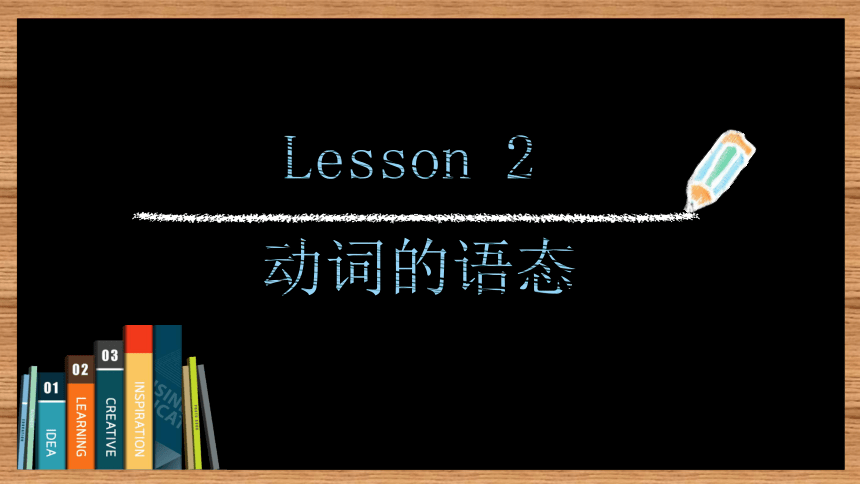
|
|
| 格式 | pptx | ||
| 文件大小 | 1.9MB | ||
| 资源类型 | 试卷 | ||
| 版本资源 | 通用版 | ||
| 科目 | 英语 | ||
| 更新时间 | 2021-09-24 00:00:00 | ||
图片预览

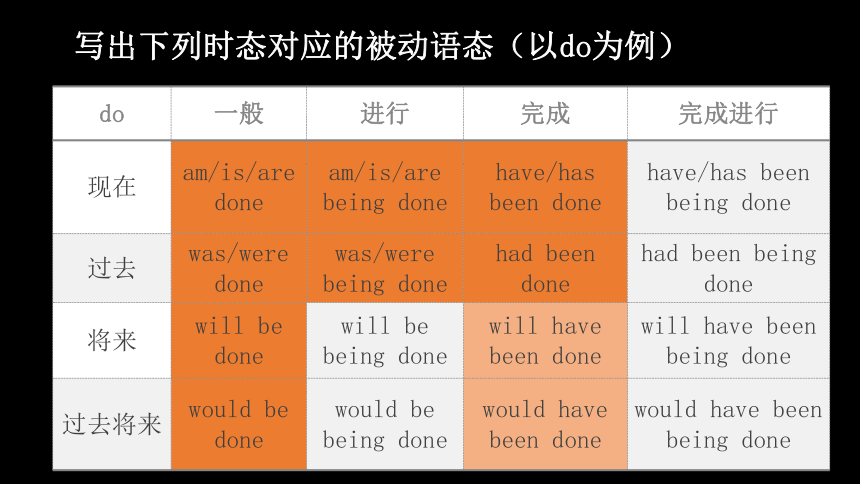
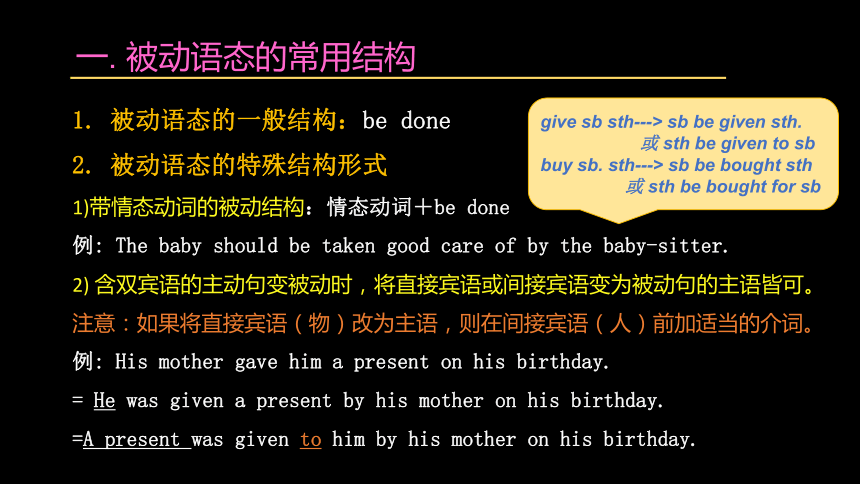
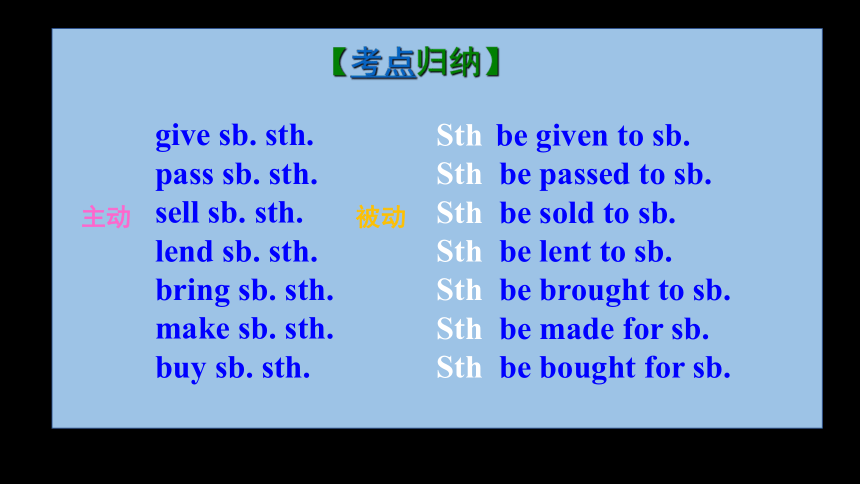
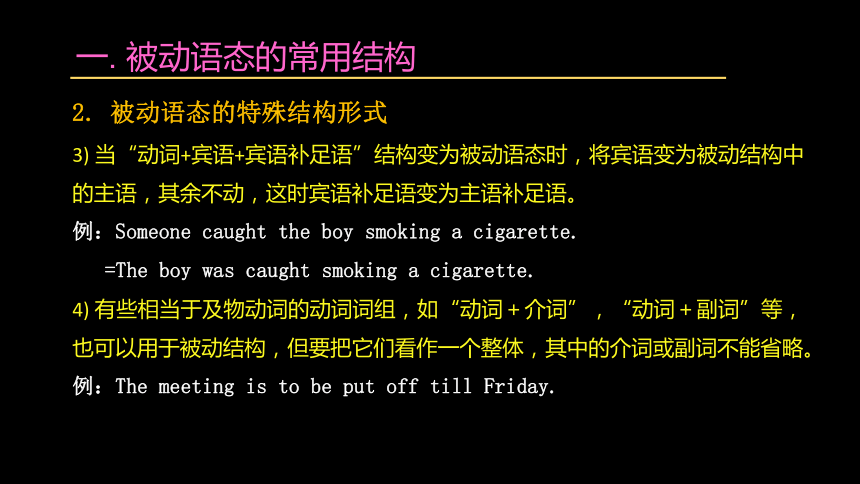
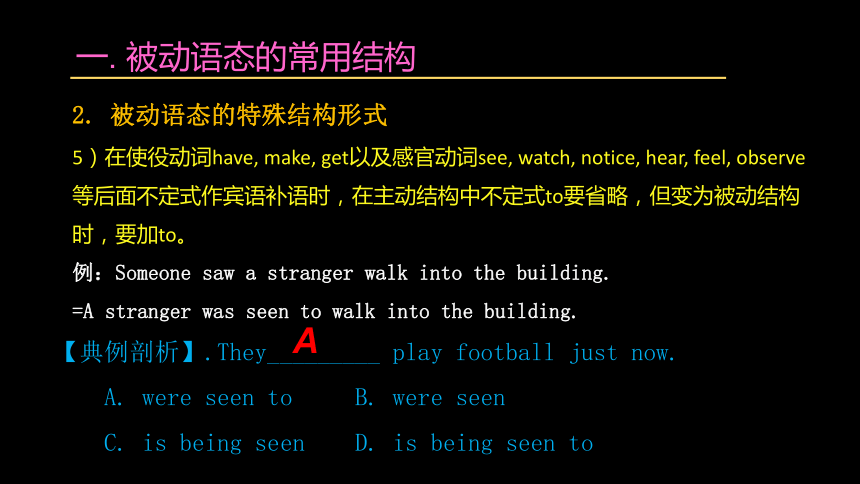
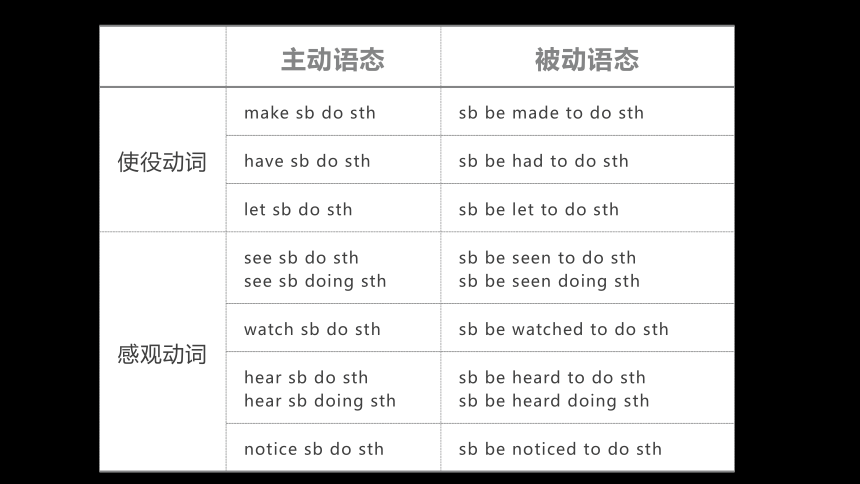
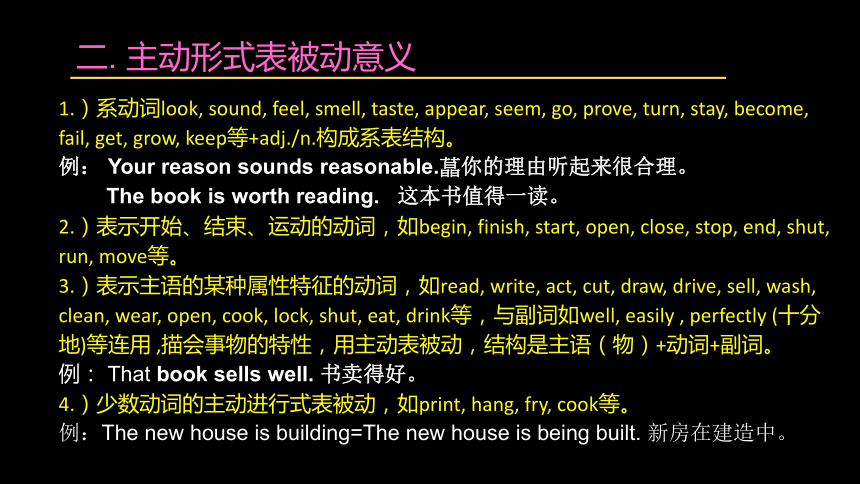
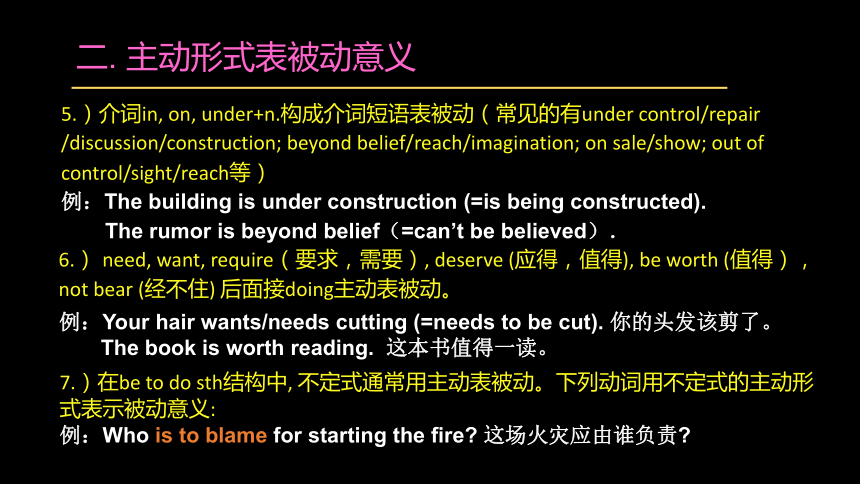
文档简介
(共23张PPT)
Lesson
2
动词的语态
do
一般
进行
完成
完成进行
现在
过去
将来
过去将来
写出下列时态对应的被动语态(以do为例)
do
一般
进行
完成
完成进行
现在
am/is/are
done
am/is/are
being
done
have/has
been
done
have/has
been
being
done
过去
was/were
done
was/were
being
done
had
been
done
had
been
being
done
将来
will
be
done
will
be
being
done
will
have
been
done
will
have
been
being
done
过去将来
would
be
done
would
be
being
done
would
have
been
done
would
have
been
being
done
1.
被动语态的一般结构:be
done
2.
被动语态的特殊结构形式
1)带情态动词的被动结构:情态动词+be
done
例:
The
baby
should
be
taken
good
care
of
by
the
baby-sitter.
2)
含双宾语的主动句变被动时,将直接宾语或间接宾语变为被动句的主语皆可。注意:如果将直接宾语(物)改为主语,则在间接宾语(人)前加适当的介词。
例:
His
mother
gave
him
a
present
on
his
birthday.
=
He
was
given
a
present
by
his
mother
on
his
birthday.
=A
present
was
given
to
him
by
his
mother
on
his
birthday.
一.
被动语态的常用结构
give
sb
sth--->
sb
be
given
sth.
或
sth
be
given
to
sb
buy
sb.
sth--->
sb
be
bought
sth
或
sth
be
bought
for
sb
【考点归纳】
give
sb.
sth.
pass
sb.
sth.
sell
sb.
sth.
lend
sb.
sth.
bring
sb.
sth.
make
sb.
sth.
buy
sb.
sth.
Sth
be
given
to
sb.
Sth
be
passed
to
sb.
Sth
be
sold
to
sb.
Sth
be
lent
to
sb.
Sth
be
brought
to
sb.
Sth
be
made
for
sb.
Sth
be
bought
for
sb.
主动
被动
2.
被动语态的特殊结构形式
3)
当“动词+宾语+宾语补足语”结构变为被动语态时,将宾语变为被动结构中的主语,其余不动,这时宾语补足语变为主语补足语。
例:Someone
caught
the
boy
smoking
a
cigarette.
=The
boy
was
caught
smoking
a
cigarette.
4)
有些相当于及物动词的动词词组,如“动词+介词”,“动词+副词”等,也可以用于被动结构,但要把它们看作一个整体,其中的介词或副词不能省略。
例:The
meeting
is
to
be
put
off
till
Friday.
一.
被动语态的常用结构
2.
被动语态的特殊结构形式
5)在使役动词have,
make,
get以及感官动词see,
watch,
notice,
hear,
feel,
observe等后面不定式作宾语补语时,在主动结构中不定式to要省略,但变为被动结构时,要加to。
例:Someone
saw
a
stranger
walk
into
the
building.
=A
stranger
was
seen
to
walk
into
the
building.
一.
被动语态的常用结构
【典例剖析】.They_________
play
football
just
now.
A.
were
seen
to
B.
were
seen
C.
is
being
seen
D.
is
being
seen
to
A
主动语态
被动语态
使役动词
make
sb
do
sth
sb
be
made
to
do
sth
have
sb
do
sth
sb
be
had
to
do
sth
let
sb
do
sth
sb
be
let
to
do
sth
感观动词
see
sb
do
sth
see
sb
doing
sth
sb
be
seen
to
do
sth
sb
be
seen
doing
sth
watch
sb
do
sth
sb
be
watched
to
do
sth
hear
sb
do
sth
hear
sb
doing
sth
sb
be
heard
to
do
sth
sb
be
heard
doing
sth
notice
sb
do
sth
sb
be
noticed
to
do
sth
1.)系动词look,
sound,
feel,
smell,
taste,
appear,
seem,
go,
prove,
turn,
stay,
become,
fail,
get,
grow,
keep等+adj./n.构成系表结构。
例:
Your
reason
sounds
reasonable.?你的理由听起来很合理。
The
book
is
worth
reading.
这本书值得一读。
2.)表示开始、结束、运动的动词,如begin,
finish,
start,
open,
close,
stop,
end,
shut,
run,
move等。
3.)表示主语的某种属性特征的动词,如read,
write,
act,
cut,
draw,
drive,
sell,
wash,
clean,
wear,
open,
cook,
lock,
shut,
eat,
drink等,与副词如well,
easily
,
perfectly
(十分地)等连用
,描会事物的特性,用主动表被动,结构是主语(物)+动词+副词。
例:
That
book
sells
well.
书卖得好。
4.)少数动词的主动进行式表被动,如print,
hang,
fry,
cook等。
例:The
new
house
is
building=The
new
house
is
being
built.
新房在建造中。
二.
主动形式表被动意义
6.)
need,
want,
require(要求,需要),
deserve
(应得,值得),
be
worth
(值得),not
bear
(经不住)
后面接doing主动表被动。
二.
主动形式表被动意义
7.)在be
to
do
sth结构中,
不定式通常用主动表被动。下列动词用不定式的主动形式表示被动意义:
例:Who
is
to
blame
for
starting
the
fire?
这场火灾应由谁负责?
例:Your
hair
wants/needs
cutting
(=needs
to
be
cut).
你的头发该剪了。
The
book
is
worth
reading.
这本书值得一读。
5.)介词in,
on,
under+n.构成介词短语表被动(常见的有under
control/repair
/discussion/construction;
beyond
belief/reach/imagination;
on
sale/show;
out
of
control/sight/reach等)
例:The
building
is
under
construction
(=is
being
constructed).
The
rumor
is
beyond
belief(=can’t
be
believed).
二.
主动形式表被动意义
8.)一些与can’t
(不能)
或won’t
(不会)
连用的动词。常用的有:
lock
(锁住),
shut
(关上)
,
open
(打开),
act
(上演),
write
(写),cut
(砍,切),wear
(穿,戴)等,用作不及物动词时,用主动表被动。
例:The
door
won’t
open.
这门打不开
注意:主动语态表被动强调的是主语的特征,而被动语态则强调外界作用造成的影响。
试比较:The
door
won't
lock.
(指门本身有毛病)
The
door
won't
be
locked.
(指不会有人来锁门,
指“门没有锁”是人的原因)
9.)不定式作定语,放在被修饰词后面,与前面被修饰的名词或代词有动宾关系,又在句子中与另一名词或代词有主谓关系,不定式要用主动表被动含义。
例:I
have
much
work
to
do.
我有许多要做的事情。
(与work有动宾关系,与I有主谓关系)
Exercises:
choose
the
best
choice.
There
are
many
good
films
played
by
ChengLong
that
are
worth
_____.
A.
to
be
seen
B.
being
seen
C.
seeing
D.
to
see
2.
The
food
_____
easily
and
sells
_____.
A.
cooks
;
well
B.
is
cooking;
good
C.
is
cooked;
well
D.
cooked;
good
3.
The
windows
of
the
building
can’t
_____.
A.
be
closed
B.
close
C.
be
closing
D.
closed
C
A
B
1.)不及物动词(短语)不用于被动语态,如:happen,
last,
take
place,
occur,
break
out,
come
out,
come
about,
come
true,
run
out,
give
out,
turn
out,
spread等。
例
How
do
the
newspapers
come
out?
这些报纸是如何引出来的呢?
2.)表示状态的动词(短语)不用于被动语态,如含“容纳、适合、缺少”等
意义的词hold,
contain,
fit,
lack,
benefit,
cost,
join,
mean,
last,
look
like,
consist
of等。
例:
The
room
can
hold
200
people.
这个房间可容纳200人。
3.)表示归属的动词(短语)不用于被动语态,如have,
belong
to,
own等。
例:
That
book
belongs
to
me.
书属于我。
三.
不用被动语态的情况
被动语态与系表结构的区别:
当“be+过去分词”作被动语态时表示主语承受的动作;作系表结构时表示
主语的特点或所处的状态时,be后面的过去分词是表语,相当于形容词。
其区分办法如下:
1.如果强调动作或句中有介词by引导出动作的执行者,该句一般为
被动语态,否则为系表结构。
例:The
glass
is
broken.
(系表结构)
The
glass
was
broken
by
the
boy.
(被动语态)
2.如果句中有地点、频率或时间状语时,一般为被动语态。
例:The
door
is
locked.
(系表结构)
The
door
has
already/just
been
locked.(被动语态)
系表结构中的过去分词常有其固定的介词搭配,这时过去分词都变成了形容词,
因此也是看似被动实际表主动。如:
be
interested
(in…),be
surprised
at,
be
excited
about,
be
satisfied/
pleased
with,
be
disappointed,
be
shocked,
be
moved,
be
amazed,
be
frightened,
be
delighted,
be
ashamed
等。
3.一些特殊结构
1)
be
seated
=
sit
down,
take
one’s
seat
就座
The
woman
seated
by
the
window
is
his
mother.
=
The
woman
sitting
by
the
window
is
his
mother.
这样的动词本来就是及物动词,而且后面可跟反身代词做宾语.
类似的词还有dress,
lose,
apply,
devote等。
She
seated
herself
on
the
sofa.
=
She
was
seated
on
the
sofa.
她坐在沙发上。
I
dress
myself
in
clean
clothes.
=
I
get/am
dressed
in
clean
clothes.
我穿上了干净衣服。
2)
be
prepared
(for…)
=
prepare
(for…);
be
ready
(for…)
(为…)准备好
eg:
She
was
prepared
for
anything
to
happen.
她已准备好应付一切.
Well-prepared
for
the
exam,
all
the
students
took
it
confidently.
3)
be
worried
(about
…
)
=
worry
(about…)
对…担心
eg:
She
was
worried
about
her
missing
son.
=
She
worried
herself
about
her
missing
son.
她担心她失踪的儿子。
4)
be
concerned
(about/
with…
)
=
care
about…/
be
relevant
to…关心…;
与…有关联
eg:
We
are
all
concerned
about
his
health.?
【对...担忧】
我们都担心他的健康
We're
all
concerned
for
her
safety.
【对...关注】
我们都关注她的安危
This
book
is
concerned
with
the
adolescent
crime.
【与...有关;涉及...】
这本书与青少年犯罪有关。
5.
be
supposed
(to…)
=
should
应该
eg:
Am
I
supposed
to
clean
all
the
rooms
or
just
this
one?
=
Should
I
clean
all
the
rooms
or
just
this
one?
我应该打扫所有的房间还是仅一间?
6.
be
devoted
to
(doing)
=be
loving
or
loyal
热爱的;
忠实的
eg:
She
is
devoted
to
her
children.
她深爱她的孩子.
Her
life
was
devoted
to
caring
for
the
sick
and
needy.?
她一生都致力于关心照顾贫病交迫的人。
7.
be
addicted
(to…)
=
be
strongly
interested
(in…)对…上瘾
He
was
addicted
to
smoking.
8.
be
used
(to…)
习惯于…
After
three
weeks
she
had
got
used
to
the
extreme
heat.
9.
be
accustomed
(to…)
=be
used
(to…)
习惯(于….)
I
soon
got
accustomed
to
his
strange
ways.
我不久就习惯了他那些奇怪的做法.
以上词组中的to均为介词,其后动词用doing形式
Fill
in
the
blanks
with
the
proper
form
of
the
given
verbs:
1.__________(
dress)
in
white,
he
looks
like
a
doctor.
2.
After
_________
(stay)
here
for
1
year,
he
_______________
(accustom)
to
the
hot
weather.
3.
You
_____________
(suppose)
to
arrive
here
before
8
o’clock.
4.
You
can
pass
the
exam
as
long
as
you
________________
(prepare,
well)
for
it.
5.
After
all
the
people
____________
(seat),
the
chairman
announced
the
start
of
the
meeting.
Dressed
staying
is
accustomed
are
supposed
are
well-prepared
were
seated
Exercise:
choose
the
best
answer
1.The
construction
of
the
two
new
railway
lines______by
now.
A.has
completed
B.have
completed
C.have
been
completed
D.has
been
completed
2.The
traffic
in
our
city
is
already
good
and
it________
even
better.
A.
gets
B.
got
C.
has
got
D.
is
getting
3.You
can't
move
in
right
now.The
house
_______.
A.has
painted
B.is
painted
C.is
being
painted
D.is
painting
4.I
have
no
idea
what
_______
while
I
was
asleep.
A.
has
happened
B.
was
happened
C.
had
happened
D.
happened
C
D
C
D
Exercise:
choose
the
best
answer
5.-
Do
you
like
the
new
pen?
-
Yes,it
_______
very
well.
A.is
written
B.is
writing
C.writes
D.wrote
6.They
believed
that
by
using
computers
the
production
of
their
factory
________.
A.will
greatly
increase
B.would
greatly
increase
C.would
be
increased
greatly
D.will
have
been
greatly
increased
7.ls
this
the
third
time
that
you
_______
late?
A.have
been
B.am
C.was
D.had
been
C
C
A
Exercise:
choose
the
best
answer
8.Do
I
have
to
take
this
medicine?
It
_______
so
terrible.
A.tastes
B.is
tasting
C.is
tasted
D.has
tasted
9.Don't
take
the
magazine
away.It
_______
me.
A.is
belonged
to
B.belongs
to
C.was
belonged
to
D.is
belonging
to
10.He
will
have
learned
English
for
eight
years
by
the
time
he
_________
from
the
university
next
year.
A.will
graduate
B.will
have
graduated
C.graduates
D.is
to
graduate
11.I
feel
it
is
your
husband
who
_______
for
the
spoiled
child.
A.is
to
blame
B.is
going
to
blame
C.is
to
be
blamed
D.should
blame
A
B
A
C
Thanks
for
listening
Lesson
2
动词的语态
do
一般
进行
完成
完成进行
现在
过去
将来
过去将来
写出下列时态对应的被动语态(以do为例)
do
一般
进行
完成
完成进行
现在
am/is/are
done
am/is/are
being
done
have/has
been
done
have/has
been
being
done
过去
was/were
done
was/were
being
done
had
been
done
had
been
being
done
将来
will
be
done
will
be
being
done
will
have
been
done
will
have
been
being
done
过去将来
would
be
done
would
be
being
done
would
have
been
done
would
have
been
being
done
1.
被动语态的一般结构:be
done
2.
被动语态的特殊结构形式
1)带情态动词的被动结构:情态动词+be
done
例:
The
baby
should
be
taken
good
care
of
by
the
baby-sitter.
2)
含双宾语的主动句变被动时,将直接宾语或间接宾语变为被动句的主语皆可。注意:如果将直接宾语(物)改为主语,则在间接宾语(人)前加适当的介词。
例:
His
mother
gave
him
a
present
on
his
birthday.
=
He
was
given
a
present
by
his
mother
on
his
birthday.
=A
present
was
given
to
him
by
his
mother
on
his
birthday.
一.
被动语态的常用结构
give
sb
sth--->
sb
be
given
sth.
或
sth
be
given
to
sb
buy
sb.
sth--->
sb
be
bought
sth
或
sth
be
bought
for
sb
【考点归纳】
give
sb.
sth.
pass
sb.
sth.
sell
sb.
sth.
lend
sb.
sth.
bring
sb.
sth.
make
sb.
sth.
buy
sb.
sth.
Sth
be
given
to
sb.
Sth
be
passed
to
sb.
Sth
be
sold
to
sb.
Sth
be
lent
to
sb.
Sth
be
brought
to
sb.
Sth
be
made
for
sb.
Sth
be
bought
for
sb.
主动
被动
2.
被动语态的特殊结构形式
3)
当“动词+宾语+宾语补足语”结构变为被动语态时,将宾语变为被动结构中的主语,其余不动,这时宾语补足语变为主语补足语。
例:Someone
caught
the
boy
smoking
a
cigarette.
=The
boy
was
caught
smoking
a
cigarette.
4)
有些相当于及物动词的动词词组,如“动词+介词”,“动词+副词”等,也可以用于被动结构,但要把它们看作一个整体,其中的介词或副词不能省略。
例:The
meeting
is
to
be
put
off
till
Friday.
一.
被动语态的常用结构
2.
被动语态的特殊结构形式
5)在使役动词have,
make,
get以及感官动词see,
watch,
notice,
hear,
feel,
observe等后面不定式作宾语补语时,在主动结构中不定式to要省略,但变为被动结构时,要加to。
例:Someone
saw
a
stranger
walk
into
the
building.
=A
stranger
was
seen
to
walk
into
the
building.
一.
被动语态的常用结构
【典例剖析】.They_________
play
football
just
now.
A.
were
seen
to
B.
were
seen
C.
is
being
seen
D.
is
being
seen
to
A
主动语态
被动语态
使役动词
make
sb
do
sth
sb
be
made
to
do
sth
have
sb
do
sth
sb
be
had
to
do
sth
let
sb
do
sth
sb
be
let
to
do
sth
感观动词
see
sb
do
sth
see
sb
doing
sth
sb
be
seen
to
do
sth
sb
be
seen
doing
sth
watch
sb
do
sth
sb
be
watched
to
do
sth
hear
sb
do
sth
hear
sb
doing
sth
sb
be
heard
to
do
sth
sb
be
heard
doing
sth
notice
sb
do
sth
sb
be
noticed
to
do
sth
1.)系动词look,
sound,
feel,
smell,
taste,
appear,
seem,
go,
prove,
turn,
stay,
become,
fail,
get,
grow,
keep等+adj./n.构成系表结构。
例:
Your
reason
sounds
reasonable.?你的理由听起来很合理。
The
book
is
worth
reading.
这本书值得一读。
2.)表示开始、结束、运动的动词,如begin,
finish,
start,
open,
close,
stop,
end,
shut,
run,
move等。
3.)表示主语的某种属性特征的动词,如read,
write,
act,
cut,
draw,
drive,
sell,
wash,
clean,
wear,
open,
cook,
lock,
shut,
eat,
drink等,与副词如well,
easily
,
perfectly
(十分地)等连用
,描会事物的特性,用主动表被动,结构是主语(物)+动词+副词。
例:
That
book
sells
well.
书卖得好。
4.)少数动词的主动进行式表被动,如print,
hang,
fry,
cook等。
例:The
new
house
is
building=The
new
house
is
being
built.
新房在建造中。
二.
主动形式表被动意义
6.)
need,
want,
require(要求,需要),
deserve
(应得,值得),
be
worth
(值得),not
bear
(经不住)
后面接doing主动表被动。
二.
主动形式表被动意义
7.)在be
to
do
sth结构中,
不定式通常用主动表被动。下列动词用不定式的主动形式表示被动意义:
例:Who
is
to
blame
for
starting
the
fire?
这场火灾应由谁负责?
例:Your
hair
wants/needs
cutting
(=needs
to
be
cut).
你的头发该剪了。
The
book
is
worth
reading.
这本书值得一读。
5.)介词in,
on,
under+n.构成介词短语表被动(常见的有under
control/repair
/discussion/construction;
beyond
belief/reach/imagination;
on
sale/show;
out
of
control/sight/reach等)
例:The
building
is
under
construction
(=is
being
constructed).
The
rumor
is
beyond
belief(=can’t
be
believed).
二.
主动形式表被动意义
8.)一些与can’t
(不能)
或won’t
(不会)
连用的动词。常用的有:
lock
(锁住),
shut
(关上)
,
open
(打开),
act
(上演),
write
(写),cut
(砍,切),wear
(穿,戴)等,用作不及物动词时,用主动表被动。
例:The
door
won’t
open.
这门打不开
注意:主动语态表被动强调的是主语的特征,而被动语态则强调外界作用造成的影响。
试比较:The
door
won't
lock.
(指门本身有毛病)
The
door
won't
be
locked.
(指不会有人来锁门,
指“门没有锁”是人的原因)
9.)不定式作定语,放在被修饰词后面,与前面被修饰的名词或代词有动宾关系,又在句子中与另一名词或代词有主谓关系,不定式要用主动表被动含义。
例:I
have
much
work
to
do.
我有许多要做的事情。
(与work有动宾关系,与I有主谓关系)
Exercises:
choose
the
best
choice.
There
are
many
good
films
played
by
ChengLong
that
are
worth
_____.
A.
to
be
seen
B.
being
seen
C.
seeing
D.
to
see
2.
The
food
_____
easily
and
sells
_____.
A.
cooks
;
well
B.
is
cooking;
good
C.
is
cooked;
well
D.
cooked;
good
3.
The
windows
of
the
building
can’t
_____.
A.
be
closed
B.
close
C.
be
closing
D.
closed
C
A
B
1.)不及物动词(短语)不用于被动语态,如:happen,
last,
take
place,
occur,
break
out,
come
out,
come
about,
come
true,
run
out,
give
out,
turn
out,
spread等。
例
How
do
the
newspapers
come
out?
这些报纸是如何引出来的呢?
2.)表示状态的动词(短语)不用于被动语态,如含“容纳、适合、缺少”等
意义的词hold,
contain,
fit,
lack,
benefit,
cost,
join,
mean,
last,
look
like,
consist
of等。
例:
The
room
can
hold
200
people.
这个房间可容纳200人。
3.)表示归属的动词(短语)不用于被动语态,如have,
belong
to,
own等。
例:
That
book
belongs
to
me.
书属于我。
三.
不用被动语态的情况
被动语态与系表结构的区别:
当“be+过去分词”作被动语态时表示主语承受的动作;作系表结构时表示
主语的特点或所处的状态时,be后面的过去分词是表语,相当于形容词。
其区分办法如下:
1.如果强调动作或句中有介词by引导出动作的执行者,该句一般为
被动语态,否则为系表结构。
例:The
glass
is
broken.
(系表结构)
The
glass
was
broken
by
the
boy.
(被动语态)
2.如果句中有地点、频率或时间状语时,一般为被动语态。
例:The
door
is
locked.
(系表结构)
The
door
has
already/just
been
locked.(被动语态)
系表结构中的过去分词常有其固定的介词搭配,这时过去分词都变成了形容词,
因此也是看似被动实际表主动。如:
be
interested
(in…),be
surprised
at,
be
excited
about,
be
satisfied/
pleased
with,
be
disappointed,
be
shocked,
be
moved,
be
amazed,
be
frightened,
be
delighted,
be
ashamed
等。
3.一些特殊结构
1)
be
seated
=
sit
down,
take
one’s
seat
就座
The
woman
seated
by
the
window
is
his
mother.
=
The
woman
sitting
by
the
window
is
his
mother.
这样的动词本来就是及物动词,而且后面可跟反身代词做宾语.
类似的词还有dress,
lose,
apply,
devote等。
She
seated
herself
on
the
sofa.
=
She
was
seated
on
the
sofa.
她坐在沙发上。
I
dress
myself
in
clean
clothes.
=
I
get/am
dressed
in
clean
clothes.
我穿上了干净衣服。
2)
be
prepared
(for…)
=
prepare
(for…);
be
ready
(for…)
(为…)准备好
eg:
She
was
prepared
for
anything
to
happen.
她已准备好应付一切.
Well-prepared
for
the
exam,
all
the
students
took
it
confidently.
3)
be
worried
(about
…
)
=
worry
(about…)
对…担心
eg:
She
was
worried
about
her
missing
son.
=
She
worried
herself
about
her
missing
son.
她担心她失踪的儿子。
4)
be
concerned
(about/
with…
)
=
care
about…/
be
relevant
to…关心…;
与…有关联
eg:
We
are
all
concerned
about
his
health.?
【对...担忧】
我们都担心他的健康
We're
all
concerned
for
her
safety.
【对...关注】
我们都关注她的安危
This
book
is
concerned
with
the
adolescent
crime.
【与...有关;涉及...】
这本书与青少年犯罪有关。
5.
be
supposed
(to…)
=
should
应该
eg:
Am
I
supposed
to
clean
all
the
rooms
or
just
this
one?
=
Should
I
clean
all
the
rooms
or
just
this
one?
我应该打扫所有的房间还是仅一间?
6.
be
devoted
to
(doing)
=be
loving
or
loyal
热爱的;
忠实的
eg:
She
is
devoted
to
her
children.
她深爱她的孩子.
Her
life
was
devoted
to
caring
for
the
sick
and
needy.?
她一生都致力于关心照顾贫病交迫的人。
7.
be
addicted
(to…)
=
be
strongly
interested
(in…)对…上瘾
He
was
addicted
to
smoking.
8.
be
used
(to…)
习惯于…
After
three
weeks
she
had
got
used
to
the
extreme
heat.
9.
be
accustomed
(to…)
=be
used
(to…)
习惯(于….)
I
soon
got
accustomed
to
his
strange
ways.
我不久就习惯了他那些奇怪的做法.
以上词组中的to均为介词,其后动词用doing形式
Fill
in
the
blanks
with
the
proper
form
of
the
given
verbs:
1.__________(
dress)
in
white,
he
looks
like
a
doctor.
2.
After
_________
(stay)
here
for
1
year,
he
_______________
(accustom)
to
the
hot
weather.
3.
You
_____________
(suppose)
to
arrive
here
before
8
o’clock.
4.
You
can
pass
the
exam
as
long
as
you
________________
(prepare,
well)
for
it.
5.
After
all
the
people
____________
(seat),
the
chairman
announced
the
start
of
the
meeting.
Dressed
staying
is
accustomed
are
supposed
are
well-prepared
were
seated
Exercise:
choose
the
best
answer
1.The
construction
of
the
two
new
railway
lines______by
now.
A.has
completed
B.have
completed
C.have
been
completed
D.has
been
completed
2.The
traffic
in
our
city
is
already
good
and
it________
even
better.
A.
gets
B.
got
C.
has
got
D.
is
getting
3.You
can't
move
in
right
now.The
house
_______.
A.has
painted
B.is
painted
C.is
being
painted
D.is
painting
4.I
have
no
idea
what
_______
while
I
was
asleep.
A.
has
happened
B.
was
happened
C.
had
happened
D.
happened
C
D
C
D
Exercise:
choose
the
best
answer
5.-
Do
you
like
the
new
pen?
-
Yes,it
_______
very
well.
A.is
written
B.is
writing
C.writes
D.wrote
6.They
believed
that
by
using
computers
the
production
of
their
factory
________.
A.will
greatly
increase
B.would
greatly
increase
C.would
be
increased
greatly
D.will
have
been
greatly
increased
7.ls
this
the
third
time
that
you
_______
late?
A.have
been
B.am
C.was
D.had
been
C
C
A
Exercise:
choose
the
best
answer
8.Do
I
have
to
take
this
medicine?
It
_______
so
terrible.
A.tastes
B.is
tasting
C.is
tasted
D.has
tasted
9.Don't
take
the
magazine
away.It
_______
me.
A.is
belonged
to
B.belongs
to
C.was
belonged
to
D.is
belonging
to
10.He
will
have
learned
English
for
eight
years
by
the
time
he
_________
from
the
university
next
year.
A.will
graduate
B.will
have
graduated
C.graduates
D.is
to
graduate
11.I
feel
it
is
your
husband
who
_______
for
the
spoiled
child.
A.is
to
blame
B.is
going
to
blame
C.is
to
be
blamed
D.should
blame
A
B
A
C
Thanks
for
listening
同课章节目录
- 名词
- 动词/动词短语
- 一般现在时及其被动式
- 一般过去时及其被动式
- 现在进行时及其被动式
- 过去进行时及其被动式
- 将来进行时及其被动式
- 现在完成时及其被动式
- 过去完成时及其被动式
- 一般将来时及其被动式
- 过去将来时及其被动式
- 现在完成进行时及其被动式
- 将来完成时及其被动式
- 副词
- 介词/介词短语
- 连词/连接词
- 数词/量词
- 冠词
- 形容词
- 非谓语动词
- 句型
- 简单句与并列句
- 复合句
- 主谓一致
- 倒装与省略
- 强调句
- 虚拟语气
- 插入语
- 固定句型
- 祈使句/感叹句
- 疑问句/反义疑问句
- 非限制性定语从句
- 句型转换
- 定语从句
- 表语从句
- 宾语从句
- 主语从句
- 动词时态与语态
- 虚拟语气与情态动词
- 主谓一致
- 独立主格结构、with的复合结构
- 情态动词
- 状语从句
- 定语从句
- 特殊句式
- 交际用语
- 代词/不定代词
- 名词性从句
- 同位语从句
- 表语从句
- 宾语从句
- 主语从句
- 直接引语和间接引语
- 构词法(word formation)
